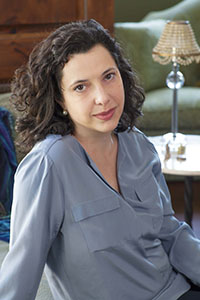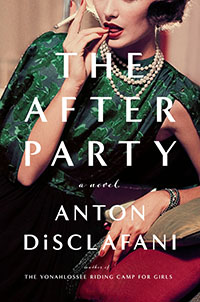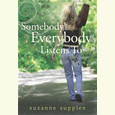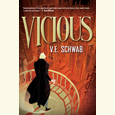Secrets, Lies, and Cocktails
Anton DiSclafani’s The After Party follows the tangled friendship of two women among Houston’s social elite
Set among Houston’s glamorous oil-industry elites during the 1950s, Anton DiSclafani’s The After Party follows two young women—one conventional, one rebellious—who are locked in a complex lifelong friendship. Joan and Cece are natives of Houston’s affluent community, River Oaks, where they were inseparable from infancy. As grown women they flit from Junior League meetings to Garden Club luncheons to endless nights of cocktails in posh hotel lounges. But fissures have formed along the seams of their social lives: Joan has grown reckless with her habitual indiscretions, and Cece can’t seem to get any straight answers from her, no matter how hard she pursues them.
 The more Joan eludes her, the more Cece defines her own happiness by her proximity to Joan’s charisma. By River Oaks standards, Cece’s own life seems ideal. She’s married to a man she loves, a man rising fast in the oil business. She has inherited her own fortune, too, which she spends on the most exquisite items of clothing. She has a son she adores—a three-year-old named Tommy. Hers is a good life—a life River Oaks trained her to acquire but which she had also truly wanted. Still, as Cece remarks, “It’s impossible, isn’t it, to spend so much time wanting one thing, and then not be suspicious of that thing when it arrives?” The After Party questions what it means to want—and find real happiness in—the life we actually get, rather than the elusive life just beyond our reach.
The more Joan eludes her, the more Cece defines her own happiness by her proximity to Joan’s charisma. By River Oaks standards, Cece’s own life seems ideal. She’s married to a man she loves, a man rising fast in the oil business. She has inherited her own fortune, too, which she spends on the most exquisite items of clothing. She has a son she adores—a three-year-old named Tommy. Hers is a good life—a life River Oaks trained her to acquire but which she had also truly wanted. Still, as Cece remarks, “It’s impossible, isn’t it, to spend so much time wanting one thing, and then not be suspicious of that thing when it arrives?” The After Party questions what it means to want—and find real happiness in—the life we actually get, rather than the elusive life just beyond our reach.
In this novel, Houston’s oil boom of the 1950s has created an atmosphere of performative spending. DiSclafani vividly portrays the conspicuous wealth of the era:
The rest of the country was worried about the Russians, worried about the Commies in our midst, worried about the Koreans. But Houston’s oil had washed its worries away. This was the place where a wealthy bachelor had bought himself a cheetah and let it live on his patio, swim in his pool; where a crazy widower flew in caviar and flavored vodka once a month for wild soirees where everyone had to speak in a Russian accent; where Silver Dollar Jim West had thrown silver coins from his chauffeur-driven limo, then pulled over to watch the crowd’s mad scramble.
Joan has always possessed a knack for this kind of decadent life, even if it has also made her too restless to abide by its underlying rules. Houston remembers her “wild child” youth—including a notorious year spent in Hollywood, trying in vain to reach stardom. “Another town wouldn’t have forgiven her Hollywood jaunt—who knew the men she’d been with, or what she’d tried out there,” DiSclafani writes. “But Houston was magnanimous in all things.” Now, after years spent running away and then returning home, sloughing off one boyfriend after another, Joan cannot maintain her lifestyle as a single girl much longer. Like Cece, she’s reached the ripe-old age of twenty-five.
 With Joan at the center of a new round of scandals, her aging mother appeals to Cece for help, claiming that only she can keep Joan in line. But Cece’s husband, Ray, has finally reached the end of his tolerance for Cece’s pursuit of Joan’s affection. Even their son seems hesitant to trust their home life—at three years old, he has yet to speak his first word. Will Cece embrace the River Oaks life she’s built with her family, or will she go on splitting herself down the center, drawn toward the powerful but inconstant force of Joan’s friendship?
With Joan at the center of a new round of scandals, her aging mother appeals to Cece for help, claiming that only she can keep Joan in line. But Cece’s husband, Ray, has finally reached the end of his tolerance for Cece’s pursuit of Joan’s affection. Even their son seems hesitant to trust their home life—at three years old, he has yet to speak his first word. Will Cece embrace the River Oaks life she’s built with her family, or will she go on splitting herself down the center, drawn toward the powerful but inconstant force of Joan’s friendship?
Cece recognizes that her own sense of self is porous: “I was capable of secrecy. I was capable of great loyalty. I was capable of a kind of faithfulness that did not occur to most people. But I wasn’t patient. I wasn’t able to put things out of my mind for any period of time. The people I loved were always threaded through my thoughts, went with me everywhere.” Nevertheless, Cece’s conventionality seems to blind her to the darker implications of Joan’s actions. Though the mystery surrounding Joan’s walkabouts may be easy for readers to guess early on, Cece stays in the dark for years.
At times the wealth and advantage of this world can make The After Party’s social tangles seem like less-than-dire stakes. But the satisfying parts of this story ultimately lie elsewhere: in the tender unfolding of Cece’s empathy and gratitude for the relationships in her life. As those relationships are stretched to their limits, they confront Cece with a question which haunts every part of this novel: how well can we really know other people—even those we love most dearly?

Emily Choate holds an M.F.A. from Sarah Lawrence College. Her fiction is forthcoming from The Florida Review, Tupelo Quarterly, and The Double Dealer, and her nonfiction has appeared in Late Night Library, Yemassee, and elsewhere. She lives in Nashville, where she’s working on a novel.


